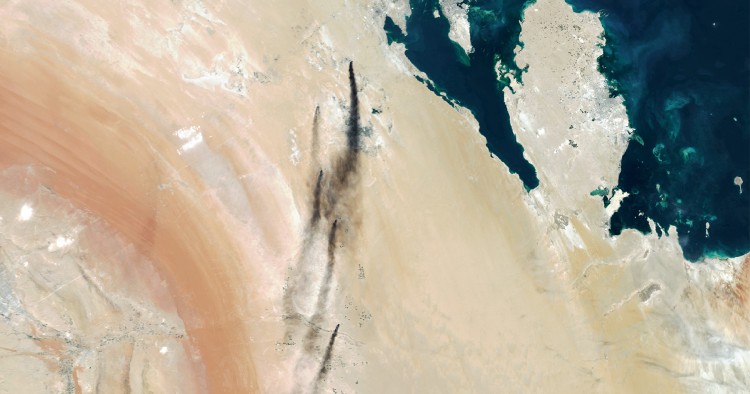This week's briefing on recent news and upcoming events in the region featuring Ruba Husari, Paul Salem, Gerald Feierstein, Amal Kandeel, Grace Wermenbol, Robert S. Ford, Charles Lister, and Gonul Tol.
Attack on Saudi oil facilities has an impact far beyond the kingdom
Ruba Husari
MEI Scholar
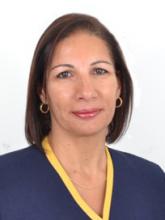
The attack over the weekend on Saudi oil facilities that knocked out 5.7 million barrels per day, or just over 50% of its crude production, marks a new threshold in the proxy war between Saudi Arabia and Iran. Beyond the immediate effect it will have on global oil markets this week, it will have a far-reaching impact both internally within the kingdom and regionally.
Within hours of the attack on the Abqaiq oil processing facility, a major gathering center for crudes from several onshore oil fields, and the Khurais oil field, Aramco announced it was in the process of restoring part of the production that was lost. It could take weeks before full production is restored, however. Saudi Aramco customers are unlikely to suffer serious immediate shortages as the state company releases barrels from storage inside and outside of the country to compensate for the lost output. For the markets, however, this will go down as the biggest attack on oil facilities in many years, and well beyond the skirmishes in the Strait of Hormuz or the ineffective targeting of Aramco’s East-West crude pipeline in May. For the first time, threats from Iran’s Revolutionary Guards and their proxies, the Houthis in Yemen or the Hashd al-Shaabi (or Popular Mobilization Forces) in Iraq, to target Saudi and other oil facilities are real.
Whether it was carried out by drones or missiles, the attack reveals the previously untested vulnerability of oil facilities in the world’s top oil exporter and the lack of an effective security shield despite its huge annual spending on armaments and defense. The breach comes at a sensitive time for Riyadh, which recently announced it was reprioritizing the planned initial public offering of Aramco shares. It is now doubtful if this can still go ahead in the coming months as the perception of risk to Aramco’s assets takes a toll.
A crisis foretold
Paul Salem
President
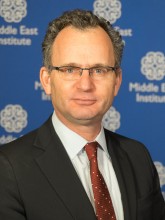
There is nothing terribly surprising about the latest major escalation against Saudi oil installations. The Trump administration withdrew from the JCPOA and re-imposed tight economic sanctions on Iran in 2018. In April of this year Iran communicated through several officials that it considered these sanctions an act of war and would inflict pain on U.S. partners, particularly the UAE and Saudi Arabia — Tehran’s calculations were, and appear to remain, that attacks on U.S. personnel would trigger too big a retaliation, and direct attacks on Israel would trigger a war that could hurt Hezbollah.
The attacks in May and June on Gulf installations and shipping were the first shot across the bow. The downing of a U.S. drone was another step up the ladder of escalation. These larger attacks are the third step. So far the attacks have drawn no significant retaliation against Iran and also no breakthrough on their goal of lifting at least some sanctions.
President Donald Trump is in a very difficult position, largely of his own making. He signaled a great reluctance to retaliate or escalate after the drone downing, and later fired his hawkish national security advisor, John Bolton. These are likely seen in Iran as signs of weakness, which in a sense they are, and encourage further escalation.
Trump and Iran have each other over barrels. Trump’s sanctions are badly hurting Iran, and their escalation is putting enormous political pressure on him.
If he does nothing, the Iranians will keep raising the temperature and oil prices will steadily edge upward, impacting his reelection campaign. If he retaliates militarily, the Iranian Revolutionary Guards will take the blow and then have license to stage a larger counterstrike in the Gulf, driving oil prices more steeply upward. If Trump concedes and extends waivers or suspends a few sanctions, he might defuse the crisis, but he will look very weak politically.
What he is trying to go for is a quick photo-op negotiation in which Iran gives some minor concessions on sunset clauses and perhaps the range of its ballistic missiles, and he can relievedly announce the lifting of at least some sanctions, and trumpet the “Trump Deal” over the terrible Obama one. So far, the Iranians are playing hard ball and not offering him that off ramp. Indeed, Iranian hardliners might not even want to offer Hassan Rouhani and Javad Zarif that off ramp.
But there is a deal that can and should be made, at least to ward off a ruinous escalation between now and the U.S. elections in November 2020. The Iran issue will be on the desk of the next president, whether it’s Trump 2.0 or a Democrat.
Bahraini crown prince to meet with Trump amid escalating Gulf tensions
Gerald Feierstein
Senior Vice President

Bahraini Crown Prince Salman bin Hamad Al Khalifa is due to meet with President Donald Trump at the White House later today. Their discussion will likely focus on Gulf security as tensions are again ratcheting up in the region. The attack on the major Saudi Aramco oil facility at Abqaiq, long identified by U.S. analysts as critical to the global energy architecture, caused substantial damage and at least temporarily knocked some five percent of global oil production off-line. Trump has indicated that he is still mulling possible U.S. responses to the attack and has not ruled out military action. Bahrain is also a member of the U.S.-led coalition to promote the security of international shipping in the Gulf and the Strait of Hormuz.
The invitation to the Bahraini crown prince, his first since he met with the president in November 2017, is also likely recognition of Bahrain’s firm stance on Arab-Israeli issues. In June, Manama hosted the “Peace and Prosperity Workshop” organized by presidential son-in-law Jared Kushner and intended to press the case for Palestinian economic development. Among the Gulf states, the Bahrainis also have been particularly outspoken in calling for normalization of relations with Israel and, in August, publicly defended Israeli attacks on Iranian targets in Iraq, Syria, and Lebanon.
One issue that will likely not be on the agenda in the Oval Office meeting this time will be human rights and civil liberties in the island nation. Despite credible allegations of the arrest and imprisonment of peaceful dissenters as well as the stripping of at least 243 Bahraini nationals of their citizenship since 2018, Trump will undoubtedly be loath to challenge his visitor on that score.
The surge in oil prices should be a wake-up call for MENA
Amal Kandeel
Director of Climate Change, Environment, and Human Security program

Shocks to the global economic system are usually not good — with minor exceptions, including when they can serve as wake-up calls. The present oil price surge due to the weekend attack on Saudi oil facilities should be one. It is a reminder of the consequences of our energy-intensive, fossil-fuel-based global production, and what it means for the security of our agricultural and food systems, where prices remain linked to those of oil — as was painfully demonstrated during the food price crisis of 2007-08 — as well as for the security of our water systems. This is particularly true for MENA.
Dependence on fossil fuels as a share of total energy consumption in MENA is over 95%, much higher than the world average. But in this region where most countries are low-income and low-middle-income, many are net energy importers. MENA is also the world's largest importer of food, and has seen food insecurity rising over the last several years. It now affects around 52 million people, mainly due to regional warfare. In addition, water security in the region depends on fossil-fuel-powered electricity generation along different stages of the water supply chain, from pumping to desalination.
If oil prices continue to rise over the coming days after their weekend surge, agricultural commodity and food prices will increase more than initially forecast in the short term amid the ongoing slowdown in the global economy. This price-inflation shock, if sustained for weeks or longer, would hurt the world's poorest and those who are already food insecure the most, including the tens of millions in MENA. It would also complicate the efforts of international aid agencies to address the alarming food crisis in Yemen and Syria, among other fragile areas in the region and elsewhere.
Tuesday’s election looks set to sustain Israeli-Palestinian political divide
Grace Wermenbol
Non-resident Scholar

While polls reveal that Israeli voters have not fundamentally shifted in the five months following the April elections, party frameworks have. One such change involves the revival of the Joint List (JL) between Palestinian-majority parties Hadash, Ta‘al, Ra‘am, and Balad in July 2019 in the hope of bringing “down the government of Prime Minister Benjamin Netanyahu” and replicating the list’s success in the 2015 elections. Palestinians, who constitute about 20 percent of the Israeli population, do not wield significant political power; throughout Israeli history Palestinian parties have played the role of the permanent opposition. The limited Palestinian political engagement –– both at the polls and in the Knesset in past decades –– is the result of both exogenous and endogenous drivers, as a new MEI report by this author highlights.
Structural obstacles put in place and sustained by the Israeli –– predominantly right-wing –– political establishment, for instance, seek to impede Palestinian electoral and parliamentary influence. Prime Minister Netanyahu’s failed legal attempts to equip ballot stations in Palestinian localities with hidden cameras, as occurred in April, thus are motivated by a desire to suppress voter turnout in those communities. At the same time, false accusations of “massive voting fraud” and discriminatory language, as uttered by Netanyahu and his coterie in the lead-up to tomorrow’s do-over election, complicate attempts at non-tribalistic politics and reinforce negative narratives against Palestinian parties and Knesset members (MKs). With Netanyahu’s most important rival, Kahol Lavan, continuing to reject meaningful cooperation with Palestinian parties, this election stands to sustain the ongoing political divide.
The recent reconstruction of the JL is unlikely to offer the means to challenge the status quo. Although the restoration of the multi-party alliance mirrors long-held support for political unification among the Palestinian electorate, turnout among this minority on Tuesday is not expected to match the 2015 level, when the JL won an unprecedented 13 seats in the Knesset — the largest number of seats that main parties representing Palestinian citizens had ever won. Nevertheless, discrepancies in MKs’ effectiveness and ongoing squabbling between the politically-divergent parties have offered an unwelcome reminder of past unrest and revived concerns over the leaders’ dedication to the Palestinian community’s interests. As a result, an ideological boycott that hinges on concerns over the ability –– and desire –– to challenge exclusionary governmental tactics cannot be excluded.
Political outsiders lead as Tunisia heads for a November runoff
Robert S. Ford
Senior Fellow
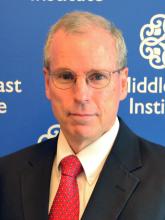
Reflecting substantial voter apathy nine years after the Tunisian revolution, about 45 percent of Tunisian voters cast ballots in the Sunday presidential election. There was a surge in voting toward the end of the day, but the turnout was still well below the 64 percent recorded in the first round of the 2014 presidential election. The head of the independent Tunisian election commission said the voting process went smoothly, a point echoed by the head of the European Union election monitoring team. The election commission is to announce official results soon, but according to polls none of the candidates received 50 percent of the vote. There will, therefore, be a second, decisive presidential election in November between the top two vote winners.
Many analysts view these two candidates as political outsiders. Retired law professor Rais Saied backed socially conservative positions and said he would not form a party while promising to empower localities and young people; he appears to have won almost 20 percent of the votes cast after his low-cost, door-to-door campaign. Meanwhile, a business magnate now in jail under investigation for money laundering, Nabil Karoui, appears to have finished second. Karoui, whose well-publicized charity work gained him support, is still a candidate until he is convicted, according to the election commission. Candidates from more established parties, including the Islamist Ennahdha party, did not score so well, a harbinger of more problems for these parties as Tunisians struggle with high unemployment and inflation and October legislative elections approach. Looking ahead to the November final round of the presidential election, a Tunisian analyst told a French newspaper that having only a choice between a strict social conservative and a populist will make many voters uncomfortable.
Idlib set to dominate talks at Turkey-Russia-Iran trilateral on Syria
Charles Lister
Director of Countering Terrorism & Extremism program
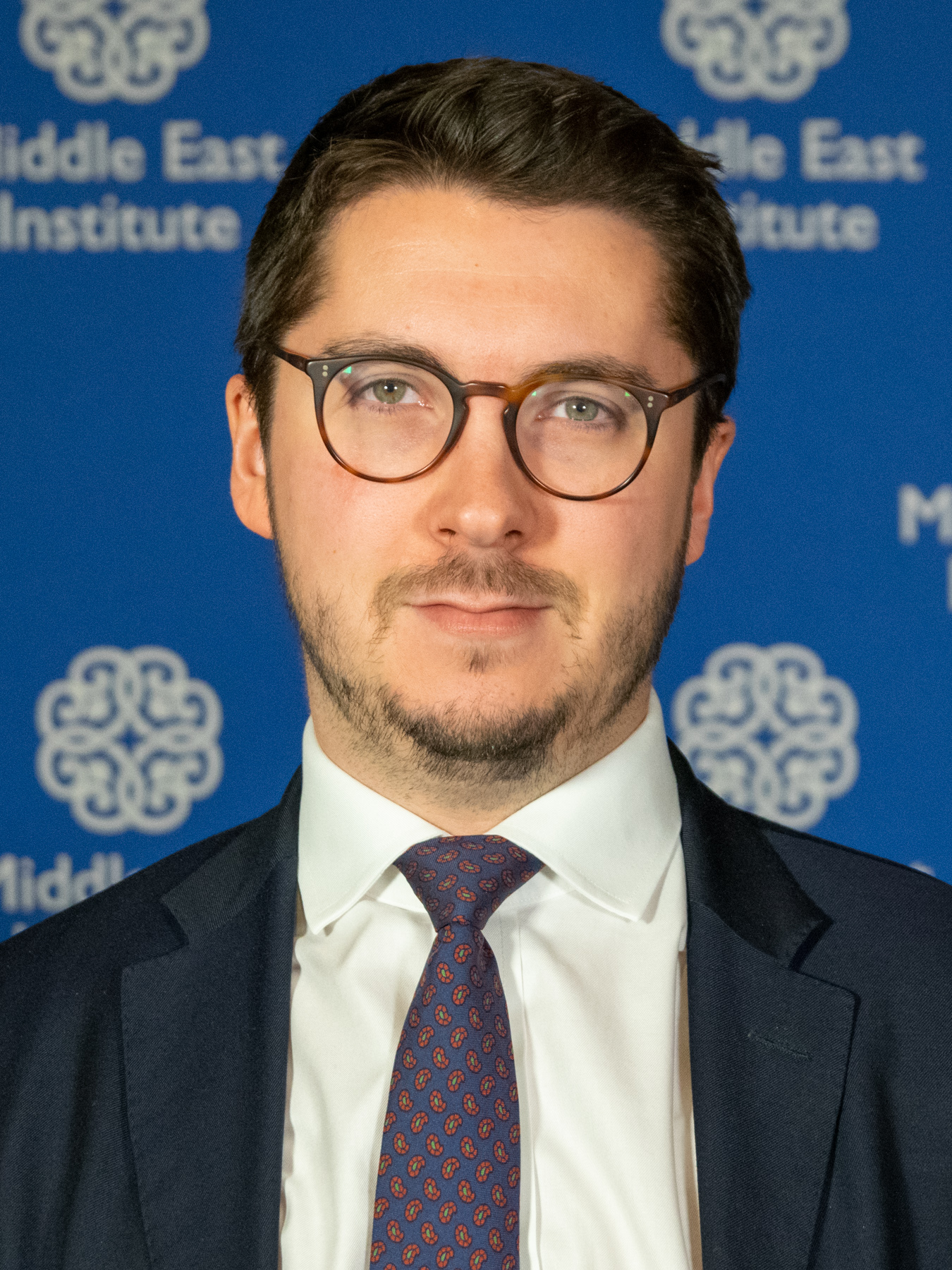
The leaders of Turkey, Russia, and Iran were set to meet today in Ankara, to discuss the crisis in Syria and to negotiate how to resolve ongoing conflict and disagreements over the political process. This would be the fifth such trilateral meeting held since November 2017, none of which have yet to qualitatively and sustainably improve the situation in Syria. Through 2019, the differences between all three countries have widened, particularly amid the eruption of conflict in northwest Syria and renewed focus on shaping Syria’s future and their respective roles in it.
For today’s meeting, the prime subject of discussion will be the most intractable one: Idlib. Russia framed its northwest offensive as “limited” from the start, but developments inevitably spiraled and the situation now looks hard to contain. A ceasefire is just about holding for now, but without a solution, it is unlikely to last forever. Until now, no solution that pleases all sides looks possible and with that, Turkey and Syria’s opposition look heavily disadvantaged. That would explain Turkey’s newly inflammatory “open the gates” rhetoric about possible large-scale refugee flows toward Europe — an attempt to force the West to back its position against further escalation. In fact, August 2019 saw the largest flow of Syrians by sea to Greece since an EU-Turkey agreement to stem the flow of refugees in March 2016. Should the crisis in Idlib become untenable, so too will the fate of its three million residents.
Russia and Turkey have both signaled in advance a desire to discuss political-level issues today, but with the Idlib question in the air, little else is likely to secure serious buy-in. For example, the trilateral meeting will certainly discuss again the formation of Syria’s Constitutional Committee, a process years in the making that Russia has long described as all but complete, but which in reality looks set to be stillborn.
Davutoglu quits AKP, but faces long odds in establishing a new party
Gonul Tol
Director for Turkish Studies

Former Prime Minister Ahmet Davutoglu has announced his resignation from Turkish President Recep Tayyip Erdogan’s ruling Justice and Development Party (AKP) days after the party began proceedings to expel him for breach of discipline. Davutoglu was sacked by Erdogan in 2016 as AKP chief and prime minister, and he has recently been critical of Erdogan’s policies. He published a manifesto on Facebook that criticized the ruling party for having moved away from democracy and the rule of law.
Davutoglu plans to launch his own party, but he faces significant challenges in doing so. He longs for the days shortly after the AKP’s founding in 2001 when it became a catch-all party attracting voters from different ideologies. But his party is unlikely to have much appeal beyond a marginal conservative bloc within the ruling party. He is seen as a staunch Islamist figure. At a time when Islamism holds little appeal after 17 years under the rule of an Islamist-rooted party, he will face an uphill battle attracting votes even from his conservative base.
Another factor that is likely to hurt his chances at the ballot box is Turkey’s 3.6 million Syrian refugees, which are seen by large segments of society as the result of Davutoglu’s Syria policy. He is not likely to appeal to Kurdish voters either, which is a significant voting bloc. The Kurds resent the government’s heavy-handed military response to the Kurdish question on his watch.
No matter how marginal Davutoglu’s future party becomes, it is certain to hurt Erdogan’s electoral fortunes. The latest local elections indicate that Erdogan is already vulnerable at the ballot box. Securing 50 percent plus 1 votes is getting harder to achieve given the country’s economic problems, the ongoing unrest within Erdogan’s party, and the momentum the opposition has gained after the local elections.
Photo by Orbital Horizon/Copernicus Sentinel Data 2019/Gallo Images via Getty Images
The Middle East Institute (MEI) is an independent, non-partisan, non-for-profit, educational organization. It does not engage in advocacy and its scholars’ opinions are their own. MEI welcomes financial donations, but retains sole editorial control over its work and its publications reflect only the authors’ views. For a listing of MEI donors, please click here.













